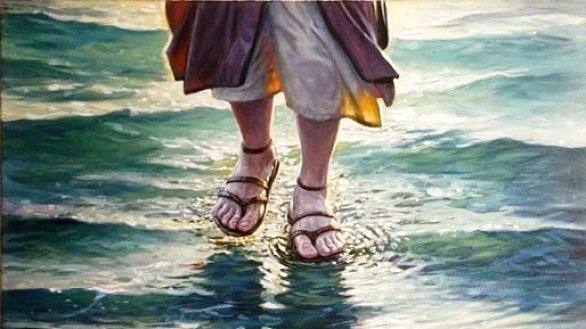Have you ever stopped to wonder and chuckle at the miracle story of Jesus walking on the water? What was that all about? We can understand that he healed people, cast out demons and fed the hungry–those are all nice reasonable things for a good teacher and a wonder worker to do.
But what was with the walking on the water? Was it a stunt? Was he showing off? Was he simply taking a short cut? “Hey guys, sorry I was late, but why did you leave without me?”
As with the story of the feeding of the 5,000, this is astounding and disturbing. The modernists would say, “Well, this story was added by the early church to make Jesus more of an amazing God-like character. It didn’t really happen.”
The problem with this is that for these “mythological elements” to have been late additions the gospels have to have been written a good long time after the actual events of Jesus’ life and none of the theories about a late dating of the gospels hold up. Even with the latest possible dates put forward by the skeptical modernists, the gospels were all completed by 80 AD. That’s just fifty years after the death, burial and resurrection of Christ. People were still alive who were eyewitnesses even then. I remember what happened fifty years ago don’t you, and if you don’t your parents do.
But the gospels can dated very reliably much earlier. I’ve written on this elsewhere on the blog. The short version is that the Acts of the Apostles is completed while St Paul is still alive. It was written before his martyrdom in 65 AD. If Acts of the Apostles was written by Luke as his sequel to his gospel, then Luke’s gospel must have been written in the early 60s or late 50s. If (as scholars believe) Luke used Mark’s gospel and a proto-Matthew (proto-Matthew is a hypothetical earlier Hebrew-Aramaic collection of Jesus stories and sayings) as sources, then Mark must have been composed mid 50s and proto-Matthew early fifties and even as early as 45 AD.
Is the story historical? What strikes us in reading the gospels is the gritty reality of the stories. These are not fanciful fictions, but accounts by eyewitnesses. Furthermore, the more outrageous the story, the more likely it is that someone recounting real events would not have made it up. If we know someone is writing fantasy fiction we’re prepared for outlandish things happening, but when Uncle George tells you about his encounter with the Mothman and you know Uncle George is the most hard headed pragmatic sort of guy, then you accept that something weird really happened, and whatever it was and whatever it means, Uncle George really did have some sort of strange experience.
So why did Jesus walk on the water? What was the point?
The clue is in remembering that Matthew is writing to his fellow Jews and it is his intention to reveal Jesus as the Son of God and the fulfillment of the whole Old Testament history of the Jewish people. Each of his actions and teachings can be seen through this lens. Matthew shows how Jesus not only fulfills certain specific prophecies from the Old Testament, but more importantly everything he says and does is a living embodiment of the Old Testament.
So here is a passage from the book of Job about God:
He alone stretches out the heavens
and treads on the waves of the sea.
9 He is the Maker of the Bear[a] and Orion,
the Pleiades and the constellations of the south.
10 He performs wonders that cannot be fathomed,
miracles that cannot be counted.
11 When he passes me, I cannot see him;
when he goes by, I cannot perceive him.
In Mark’s version there is the detail that Jesus was walking on the waves and “was going to pass them by.” Another reference to the passage in Job.
Then consider this passage from Psalm 77
Then I thought, “To this I will appeal:
the years when the Most High stretched out his right hand.
11 I will remember the deeds of the Lord;
yes, I will remember your miracles of long ago.
12 I will consider all your works
and meditate on all your mighty deeds.”13 Your ways, God, are holy.
What god is as great as our God?
14 You are the God who performs miracles;
you display your power among the peoples.
15 With your mighty arm you redeemed your people,
the descendants of Jacob and Joseph.The waters saw you, God,
the waters saw you and writhed;
the very depths were convulsed.
17 The clouds poured down water,
the heavens resounded with thunder;
your arrows flashed back and forth.
18 Your thunder was heard in the whirlwind,
your lightning lit up the world;
the earth trembled and quaked.
19 Your path led through the sea,
your way through the mighty waters,
though your footprints were not seen.
Jesus comes walking on the waves because he reveals himself as God incarnate. Indeed, the story ends with the disciples saying, “Truly you are the Son of God!”
Finally there’s this: those who deny this miracle, but also deny the truth the miracle reveals. How can someone say the Nicene Creed at Mass affirming that Jesus Christ is “God from God, Light from Light, Very God of Very God, begotten not made, consubstantial with the Father by whom all things were made” but then propose that the story of Jesus walking on the water was just a fairy tale?
Modernism.
I hate it with a holy hatred.







Modernism has almost strangled us; “Lord save us, we are falling apart”.